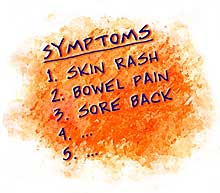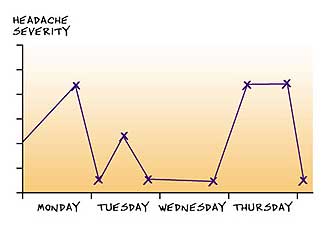We suggest you print out this page and that you use your workbook for recording your thoughts, feelings, and memories.

Firstly, make a list of your symptoms in order of importance or severity.
You may just have one symptom, for example, a skin rash or back pain.
You may have several symptoms which tend to go together, for example, abdominal pain, diarrhoea, bloating, noisy stomach. In that case you could treat them as a single group calling them“abdominal symptoms”.
You may have symptoms which don’t tend to go together. For example, you might have back pain and a skin rash and they each tend to get worse or better quite separately.
In that case it is important to treat them separately.
In the tasks that follow you will need to ask the questions around each of these symptoms.
You may have lots of symptoms, for example, fatigue, headache, abdominal symptoms, skin rash, recurrent sore throats, and so on.
Well, choose the most severe or the most important one or two. And maybe choose the ones that most clearly come in bouts or ‘attacks’, or have a beginning and an ending.
Some symptoms are a bit harder to define than others.
HAVE YOU GOT YOUR LIST OF SYMPTOMS SORTED OUT?

When did you last have a worsening of your symptoms?
If you can remember a time in the last day or week or two, great!
Or look out for a worsening over the next few days or weeks.
Most of you will be doing this program because your problem is NOW.
Some will be doing it because you don’t want to go back to that illness place—if so you might find this task a little more difficult.

A man in his 30’s developed severe chest pain 2 years before when, on the first day of work in an accountant’s office (surrounded by other workers) he suddenly felt exposed and vulnerable.
He greatly resisted any idea that the pain might be related to this vulnerability. In sessions with him I kept asking him to track what was going on for him as new bouts of pain commenced, but he was unwilling.
But eventually he came saying he noticed that soon after a ‘stressful’ encounter with his wife he developed pain. ‘Unpacking’ stress took us back to the vulnerable feelings which we first encountered in the episode in the accountant’s office.
It took him 17 sessions to lose his pain for good.

A 26 year old woman has “irritable bowel syndrome’.
She finds it very difficult to describe any of her feelings. She comes to a session saying her symptoms of abdominal pain and bloating came on at 9.05am. Try as we might, she could not think of anything significant. We question about the day before, the evening before, how she slept, did she dream?—nothing interesting emerged.
We then got very ‘micro’–what time did she get up, how did she travel to work—we persisted and persisted.
Well, she got to work and the boss said she couldn’t go to the other branch of the business for the day as she had been expecting. It turned out that she had a friend at the other branch, and was keen to have change. Her symptoms began within minutes of being told.
NOTE THE IMPORTANT THINGS
We often have to examine things closely to get an answer.

This written version can be just the way it suits you. Short or long, complex or simple—it does not matter. There is no best way except you need to access your ‘stuff’. Don’t worry if it is feeling like hard work or feels a bit vague as yet, because some people do find remembering back to the beginning difficult.
If it is hard finding words at this stage, would it help to draw some things you want to say? Colours, shapes and diagrams just may help your story emerge. You don’t have to be an artist -stick figures will do fine. You may also like to include photos, poems, newspaper cuttings —anything that you suspect could have relevance to your evolving story.
Don’t try and make it too sensible and orderly—put in anything that comes to mind. We are at the first stage. We can get access to the story by another route.
Keep your story in a folder. You will want to refer to it again.
At this point you will probably be in one of two camps
1. You may be starting to see some strands of your story—if so this section may add a few more
2. You may have struggled with the details around the beginning of your illness. If so then maybe recent events will be easier to work with and these are what we work on next.
Let’s focus on some recent occasions when your symptoms or condition worsened. And we will break the task up into bits.
Checklist for this task:
NOW USE THE PROMPTS ON THE SHEETS TO GET YOU THINKING AND WRITING.
What was going on around the time, or just before the symptoms got worse?
The smorgasbord question: What were the most interesting, significant, memorable, stressful, difficult, problematic things going on at that time?
Where were you at the time?
What was happening in relationships?
What were you working at or studying?
Were there any problems with these?
Had anything significant changed or happened–this time it could be ‘small’ events like the boss saying to his worker that she couldn’t go to the other workplace for the day. Remember-don’t judge events as important or unimportant.
Try not to answer these questions so much as use them to ask yourself what you remember from that time?
[thesis_block type=”tip” header=”Tip:” content=”Remember the ordinary things.”]
Think of the following sorts of things around the time the symptoms began. For instance, being asked to do something, being bored, going out and not having the right clothes, something someone said or didn’t say, not being noticed or thanked and so on.
THIS LIST COULD BE ENDLESS BECAUSE THE MEANINGFUL THINGS IN OUR LIVES ARE RICH AND VARIED.

Others can be helpful sometimes
Discuss with somebody who was there
Listen to that person carefully
What would she/he say was going on?
Now in the light of all this attempt writing a story around what happened—the facts, the thoughts, the feelings.
Again don’t worry if this is hard.